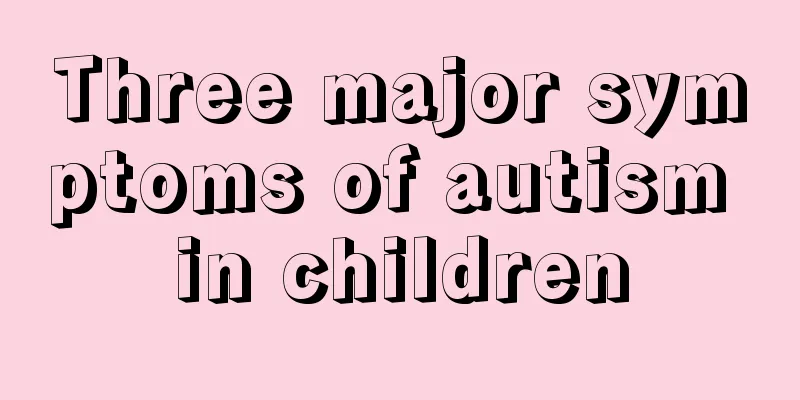What to do if your baby has delayed language development

|
Some children develop more slowly and therefore start speaking later. Parents are of course more worried about this situation, wondering if their children are dumber than other children. We must not make random judgments about our children and do not immediately conclude that they have developmental language disorders. For parents whose babies have delayed language development, this is the most important time and they have the responsibility to know what to do if their babies have delayed language development. 1. Stimulate children's desire to speak A good conversational atmosphere is the most effective way to get children to speak. Parents should take advantage of every opportunity to talk to their children non-stop, or tell them stories in a language they can understand, and persist even if they have the final say. When talking to children, parents can seize the opportunity and use methods such as inspiration, induction, questioning, and trying to get children to express their ideas. If the child responds, such as using fragmented language coupled with body movements and facial expressions to convey his meaning, encouragement should be given in a timely manner so that he can gain the satisfaction of language expression and develop the desire to express his personal ideas. At this time, the child is not speaking very well yet. Parents should not rush to correct their language problems, but first cultivate their child's confidence in speaking and let them experience the joy of expression. 2. Personalized training step by step The speech and reading training for children is one-on-one. For example, for people with receptive language disorders, the focus is on training their understanding of speech, auditory memory, and auditory perception; for people with expressive language disorders, the focus is on training them to imitate other people's speech. Regardless of the type of language delay training, parents should actively participate in it. In order to facilitate children's learning and enhance their self-confidence, parents can draw up an education plan and divide it into several small units. For children who have difficulties in language expression and reading, parents can repeatedly teach their children to recognize and read words with simple strokes and pronunciation by telling stories or setting up a specific scenario, so that they can slowly recognize, become familiar with, understand, and remember the pronunciation and meaning of these words; then slowly transition to more difficult words and phrases; and then explain to them the meaning of short and long sentences and the corresponding story content. This training is a long process and requires parents' patience and care. Parents should remember that haste makes waste. 3. A roundabout approach may be more effective For children who always have trouble speaking or reading aloud, and who have no obvious results after repeated training, it is best for parents to remain calm, because your slightest excitement and dissatisfaction will make the child feel frustrated and fearful, which will be counterproductive. For this type of child, teaching him to sing nursery rhymes, children's songs and songs is more effective than teaching him to speak and read. As long as he does not mind, you can sing to him repeatedly. For better training, parents can choose children's song tapes and CDs that their children never get tired of listening to as teaching materials for their children's learning; or record the content that children like to listen to and play it repeatedly, so that they can go from listening to speaking, and it is easier to achieve the process from quantitative change to qualitative change. From the above content, we can know what to do if the baby has delayed language development. Therefore, as parents, we must not blindly label our children. For babies with language development disorders, they should be given more speech training, and the earlier the better. This is what every parent needs to know and do. |
<<: Introduction to the process of blue light treatment for neonatal jaundice
>>: What should I do if my baby sweats while sleeping?
Recommend
Can stretching help children grow taller?
To make your child grow taller? Many parents use ...
What should I pay attention to when my 2-year-old baby has chronic pharyngitis?
In fact, the source of infection for patients wit...
Premature babies are always startled when they sleep
If a premature baby is always startled when sleep...
Why are baby's cheeks red?
The redness of the baby's cheeks is mainly ca...
How old is the child likely to get hand, foot and mouth disease?
A few years ago, there were often patients with h...
What are the dietary treatments for children's colds and coughs?
Many children are always reluctant to take medici...
What to do if teenagers have spots on their faces
There are many reasons for spots on the face, whi...
What are the late symptoms of herpetic pharyngitis in babies?
Herpangina is actually similar to hand, foot and ...
Do children need to take anthelmintics?
Experienced parents know that they should give th...
What to do if your child has repeated fever due to bacterial infection
When a child's immunity is low, bacteria can ...
Nine-month-old baby has hemangioma
Many parents will find that their babies develop ...
What to do if your child has oral herpes and a fever
Many children in their early childhood are often ...
9 month old baby keeps waking up and making noises during sleep
Babies have certain symptoms at different times. ...
What can a 2-year-old eat to grow taller?
As people's lives become more and more afflue...
What should I do if my child has a fever or diarrhea?
If a child has a fever and diarrhea, it may be fo...









